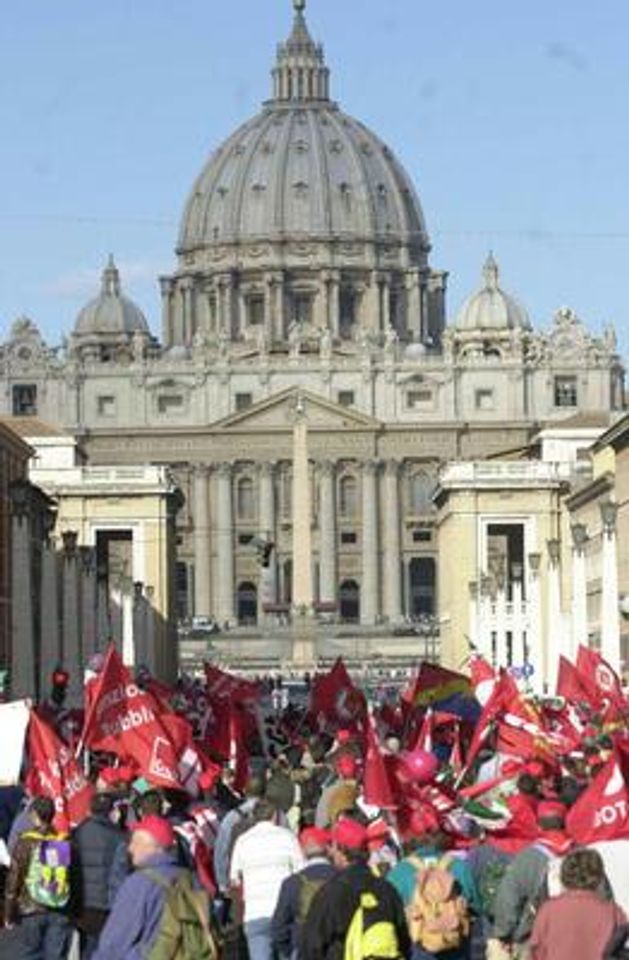WORLD SOCIALIST WEB SITE
 A PDS rally outside the Vatican
A PDS rally outside the Vatican
In two rounds of municipal and regional elections concluding December 5, 1993, the Christian Democratic Party, which had ruled Italy as part of coalition governments throughout the period since World War II, suffered an historic rout, with millions of voters shifting their support both to the neo-fascist right and the Party of the Democratic Left (PDS), the successor organization to the Italian Communist Party.
The coalition of the Christian Democrats and three smaller “center” parties won no more than 15 percent of the first round of the vote in the November 21, and placed not a single candidate into the second round, December 5, in any major city or region. In most cases, the runoffs were between candidates of the PDS and two ultra-right opponents, the MSI, the neo-fascist party founded by former supporters of Mussolini, and the Northern League, the regional chauvinist party founded by Umberto Bossi.
Candidates backed by the PDS won control of Italy’s five largest cities: Rome, Naples, Milan, Genoa and Trieste. The runoff for mayor of Rome, the capital and largest city, saw Franco Rutelli, a Green running with support from the ex-Stalinist PDS, defeat Gianfranco Fini of the MSI. The fact that the successor party to Mussolini’s blackshirts won 40 percent of the vote in the Italian capital, 50 years after the dictator’s overthrow, was a warning to the Italian and European working class.
The political authority of the Christian Democrats had been undermined by the economic crisis and massive job cuts at major industrial companies like Fiat, Olivetti and Alfa Romeo. Added to this was the impact of a mushrooming scandal over the systematic payoffs to Italian politicians of all parties by the corporate elite, in the course of which more than 3,000 politicians, bankers and corporate executives were indicted, arrested or forced to resign their positions.
Particularly destabilizing in Italy was the collapse of the Soviet Union and the resultant transformation of the main Stalinist parties in Western Europe, like the Italian Communist Party (PCI), which had a symbiotic relationship with the Christian Democrats over the previous four decades. The PCI served to politically straitjacket the working class and block any challenge to capitalist rule, while enjoying enormous privileges as the official opposition party in parliament and the ruling party in many cities and regions.
The PCI was always the most right-wing of the Stalinist parties in Western Europe, pioneering the reformist doctrine known as “Euro-Communism,” which foreshadowed the open abandonment of even the pretense of a connection between the PCI and the perspective of socialism, let alone revolution. The transformation of the PCI into the PDS was another step in grooming the former Stalinist party to play the role of stabilizer and defender of Italian capitalism after the break-up of the Christian Democrats.
50 years ago: Vietnam peace talks to be resumed
Changing its decision in early November to leave the Paris Peace Talks, the government of South Vietnam announced on December 7, 1968 it would re-join the negotiations. The envoys left Saigon just three hours after the national legislature voted to give official approval to participation in the negotiations. The delegation was led by Nguyen Cao Ky, vice president of South Vietnam and the former air force commander who was appointed the “Supreme Advisor” for the team.
 Paris peace talks deadlock over the shape of the conference table
Paris peace talks deadlock over the shape of the conference table
World Socialist Web Site for more
